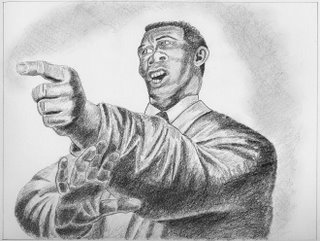PREACHING: A GREAT CAREER CHOICE

I can still speak in tongues. I tried it last night and it still works. Well at least what I say sounds exactly the same as it did when I was still involved in church leadership.
I know how to say all the right things.
I will write and execute a powerful sermon that will bring people to the Alter weeping and repenting.
I will do the eyeballing thing and I will speak with a whisper and then raise my voice loud so that people keep engrossed.
I’ll tell wonderful anecdotes and funny sidelines. At some points I will weep and others I will laugh. I will bring the bible to life with contextual background and padding.
I’ll quote memorised scripture left right and centre so that people will see that I have studied hard. I will walk though the crowd during my sermon and speak words of life and prophesy over various people in the crowd.
I will guide the church in where the spirit is leading us.
I will conclude with a challenge and people will come up weeping and needing help.
I will be prophesy over people, cast out demons, lead people to Christ and appear a spiritual giant.
That’s just the sermon part. I will look like a man of god around every corner.
It’s not hard for me because I know how it all works. I know how to act spiritual enough without looking like a loony. I know how to perform my way into church leadership.
There would be only one reason why someone would do such a thing. Ego.
Those who would have believed that I was real if I did such a thing, are they stupid?
Could anyone tell the difference between me and the next person, who wasn’t performing but was real about their convictions.
Nobody in this world knows another’s heart.
 When writing a news story you must use the inverted triangle. This is the only accepted style. The inverted triangle style states that all the ‘important’ information must be in the first sentence. The what, when, where, why, who and how must all be in the first sentence. Quotes and reported speech should be used to give the story life. Find a ‘newsworthy’ angle that is interesting and different. If it is shocking and now, it is news. Some times you have to do ‘death knocks’. That is going to the family of a dead person to get a good photo or quote. Sometimes you have to chase cars down the road; some times you have to push your way to the front of a media scrum. Sometimes you have to be rude, pushy and obnoxious.
When writing a news story you must use the inverted triangle. This is the only accepted style. The inverted triangle style states that all the ‘important’ information must be in the first sentence. The what, when, where, why, who and how must all be in the first sentence. Quotes and reported speech should be used to give the story life. Find a ‘newsworthy’ angle that is interesting and different. If it is shocking and now, it is news. Some times you have to do ‘death knocks’. That is going to the family of a dead person to get a good photo or quote. Sometimes you have to chase cars down the road; some times you have to push your way to the front of a media scrum. Sometimes you have to be rude, pushy and obnoxious.